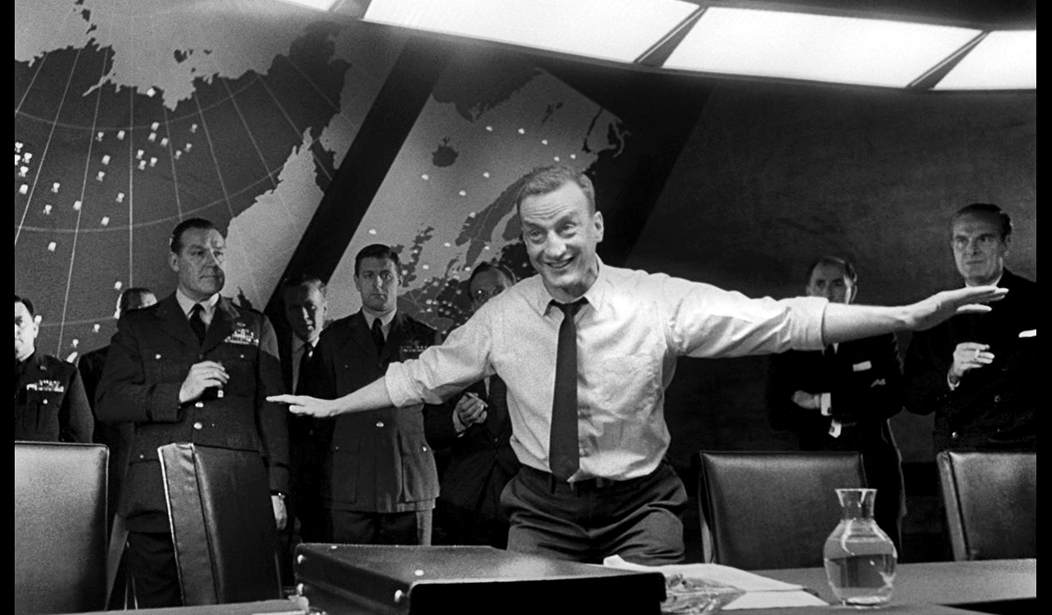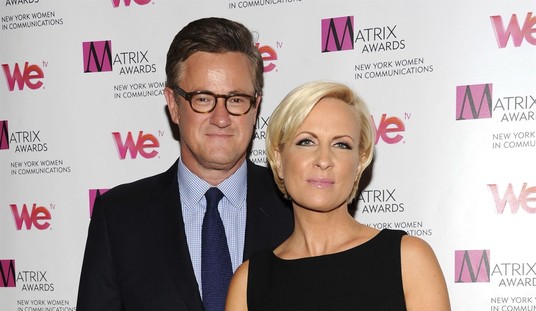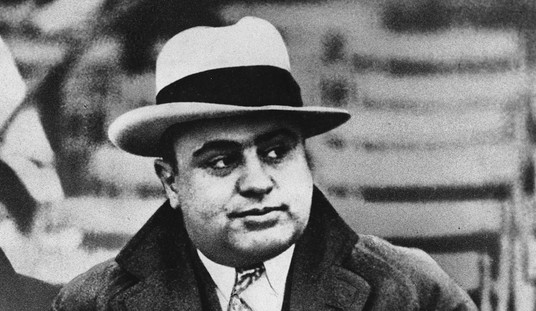The world was a very different place in January of 1964. Lyndon Johnson was president, the Soviet Union was still a going concern even though the ouster of Nikita Khrushchev and the installation of Leonid Brezhnev took place late in that year. I was two years old, toddling around my parent's eastern Iowa farmhouse. On January 29, 1964, a classic piece of Cold War film hit American theaters: Stanley Kubrick's "Dr. Strangelove, or How I Learned To Stop Worrying And Love the Bomb."
The Cold War gave us quite a bit of dark humor, of course, from "The Mouse That Roared" to "The Rocky and Bullwinkle Show." But "Dr. Strangelove" was a little different.
First, the film's cast was magnificent. The immortal Peter Sellers played three roles; the British exchange officer Group Captain Lionel Mandrake, U.S. President Merkin Muffley, and the eponymous Dr. Strangelove, an ex-Nazi and the primary character in the film. George C. Scott played General Buck Turgidson while Slim Pickens turned in a famous performance as U.S. Air Force Major T.J. "King" Kong, who, in one of the most famous scenes in American film history, rides an H-bomb from a B-52 to strike a Soviet ICBM base.
This film was also the premiere role for James Earl Jones, who played the bombardier in Major Kong's B-52.
In 1964, most people realized the very real threat of global nuclear war, with the United States on one side and the Soviet Union on the other. A few years later, when I was in elementary school in the late '60s, we regularly did the "duck and cover" drills and had classes on the likely aftermath of a nuclear exchange. Eastern Iowa would hardly have escaped such a war unscathed; among targets from Chicago to the North Dakota ICBM bases, Waterloo, Iowa, about 80 miles from our home, was on the Soviet primary target list because of the massive John Deere Waterloo Tractor plant, which was at that time the largest farm-equipment manufacturing plant in the United States.
"Dr. Strangelove" was the very definition of a dark comedy. It portrayed political leaders and military general officers alike as unhinged or impotent (literally, in the case of the American president). It showed a very real pessimism about the Cold War, the nations and leaders involved, and the likely future of humanity.
But, as we know now, that event - a full nuclear exchange between the United States and the Soviet Union - didn't happen. The Soviet Union collapsed under the weight of its own impossible governing ideology - Marxism-Leninism - and took its rightful place in the ash heap of history.
Today, though, our relationship with Russia - and China - has developed, shall we say, not in the best interest of the United States.
See Related: INSANE: The US Relies on China and Russia for Its Ammunition Supply
Republicans: New GAO Report on Chinese Ownership of US Farmland 'Confirms One of Our Worst Fears'
Russia is back under the control of an old Soviet-era KGB apparatchik. China's ruler has amassed more personal power than any leader since Mao. Both of these nations have territorial ambitions, and Russia is acting on them, but that conflict has devolved into a statement not unlike a high-tech version of the Great War.
Other things have changed as well. Both Russia and China are falling off a demographic cliff. Russia is essentially a gas station with some nuclear weapons. China is looking at a possible economic crisis, if not a full-on collapse.
See Related: China's Evergrande Group Forced Into Liquidation Leaving $300 Billion In Sad Faces Behind
Senate Panel Votes to Sic the Repo Man on Frozen Russian Assets
What would a "Dr. Strangelove" take on the modern geopolitical era look like?
First, American leadership has descended into a near-Kubrick level of haplessness.
Our president is every bit as impotent as Kubrick's President Merkin Muffley, while also suffering from an ongoing and obvious physical and mental deterioration. His administration routinely denies anything's wrong with the president, just as they deny there is a problem at our southern border, or that our $34 trillion in national debt is anything other than a catastrophe.
Our military leadership no longer consists of warriors, men who understand warfighting, prioritize warfighting, and train the troops in warfighting; instead, our military has become a jobs program for every disaffected "oppressed" group of the latest paranoia du jour.
Our primary enemy is decentralized, dispersed in cells, not necessarily under the direct control of one nation-state - there is no Nazi Germany or Imperial Japan whose industry and infrastructure we can target. And rather than fighting for nationalist expansion or grabbing at resources, they fight for a vicious, intolerant Bronze-Age religious system that endorses mass murder, mass rape, and slavery.
How could you get a dark comedy out of that? I suspect even Stanley Kubrick would have a hard time with that one.
The Soviets we understood to some extent. Russia, before and after the Soviet Union, is still a country that is a product of Western civilization. Russians love their children, they don't turn them into suicide bombers. (Although the Red Army did send men into suicidal human-wave charges, with machine guns at their backs in case any soldiers tried to withdraw.)
The jihadis, on the other hand, may as well be from another planet.
Civilized people use humor to cope with the horrible. Think about every joke you've ever heard that made you laugh out loud - not a snicker, but a full-out belly laugh. Every punch line in every such gag includes something bad happening to someone. There is an apocryphal statement often attributed to Charlie Chaplin that differentiates between tragedy and comedy: "Tragedy is when I stub my toe. Comedy is when you fall down a manhole and die." We laugh because it hurts, and the laughter helps it to stop hurting.
The Cold War gave us rather a lot of dark comedy. Some of it had hopeful tones, like "The Russians are Coming." Others, like "Dr. Strangelove," were pessimistic, mostly because of the unfavorable portrayal of human nature. And some Cold War films were just dark, without the comedy, like "On The Beach."
We laugh because it hurts. We laughed at "Dr. Strangelove" because the laughter helped us cope with the prospect of global horror. But Islamic fundamentalism and jihad are on the other side of the line; we can't laugh at it. There is no opening for dark humor because, in the world of jihad, the darkness has overwhelmed the comedy. We can't have a "Dr. Strangelove" take on today's geopolitical situation because too much about it just isn't funny.













